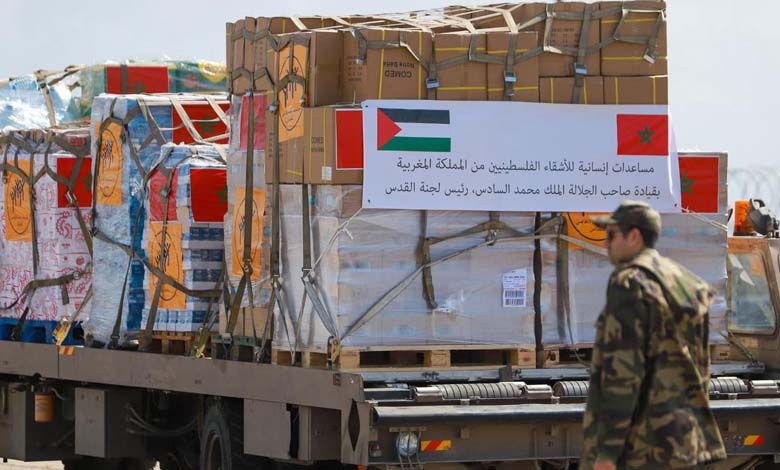Morocco Sends Urgent Humanitarian Aid to Gaza: A New Royal Initiative

Morocco’s decision to send humanitarian aid to Gaza goes far beyond its material value. It conveys a clear message: Morocco remains steadfastly committed to supporting the Palestinian people—through deeds rather than words, and through action on the ground rather than speeches from podiums.
-
Urgent relief aid from the King of Morocco to Gaza via a special route
-
New Diplomatic Achievement for Morocco with Its Election as Vice-President of the Conference on Landlocked Developing Countries
King Mohammed VI ordered the immediate delivery of approximately 100 tons of food and medicine, primarily targeting the most vulnerable groups, including children and infants. This initiative—the second of its kind in a short span of time—highlights both the humanitarian sensitivity of the monarch and the kingdom’s enduring commitment to the Palestinian cause.
To ensure efficiency and speed, Morocco established a direct air bridge, reflecting a pragmatic and methodical approach to humanitarian crises, avoiding noise, slogans, and political grandstanding.
This royal initiative demonstrates, both in its timing and substance, that Morocco’s engagement with the Palestinian issue—and the humanitarian crisis in Gaza in particular—does not stem from short-term political calculations. Instead, it reflects a comprehensive and continuous vision, showing that Moroccan support is neither seasonal nor opportunistic.
-
Morocco’s Atlantic Project: A Lifeline from Crisis for Sahel Countries
-
Morocco Reaffirms Its Steadfast Support for Palestinian Rights
The initiative can be understood across three fundamental dimensions:
- On the humanitarian level, it reflects a deep awareness of the dire conditions faced by civilians in Gaza, who continue to endure the effects of blockade and repeated escalations. The royal directive to deliver aid urgently and directly underscores effectiveness and immediacy, placing the vulnerable Palestinian civilian at the heart of priorities.
- On the political and symbolic level, it is rooted in King Mohammed VI’s role as Chairman of the Al-Quds Committee. This position grants Morocco not only a moral responsibility but also a central role in Arab and Islamic efforts to safeguard the Holy City and support the Palestinian people. Thus, humanitarian aid becomes more than an act of relief—it embodies a longstanding political and diplomatic commitment.
- On the diplomatic level, the initiative reflects Morocco’s distinctive approach to the Palestinian issue. While some countries confine themselves to symbolic statements of solidarity, Rabat consistently pairs principled political stances with tangible action. This reinforces Morocco’s credibility as a balanced and reliable regional actor, capable of combining direct humanitarian assistance with responsible diplomatic positioning.
-
26th Anniversary of the Throne Day in Morocco: Diplomacy of Empowerment and Balance
-
The Nation’s Flag Above All Others: No Alliance With Those Who Threaten Morocco’s Unity
Seen through the broader lens of foreign policy, this initiative underscores that, under King Mohammed VI’s leadership, Morocco does not treat Palestine as an ordinary external file but as a central cause with humanitarian, spiritual, and strategic dimensions.
Thus, the dispatch of aid transcends material solidarity to send a powerful political signal: Morocco remains deeply engaged, favoring concrete action over rhetoric.
The royal initiative has garnered significant coverage in both Arab and international media. Many outlets described it as a practical demonstration of solidarity at a time when most positions are confined to statements or symbolic gestures.
-
Morocco Strengthens Its Presence in Africa: Growing Military Cooperation with Ethiopia
-
Ghana Supports Morocco’s Proposal on the Sahara
In Arab media, the initiative was framed as a natural extension of Morocco’s historic commitment to the Palestinian cause, with reports emphasizing that the aid included not only food supplies but also essential medicines for the most vulnerable, particularly children. This gives the initiative exceptional humanitarian weight against the backdrop of Gaza’s tragic circumstances.
The media reaction resonated strongly with public opinion, which views Morocco as a model country that balances principled consistency with tangible humanitarian action. In this way, the aid operation becomes more than a logistical mission—it also serves as a strong diplomatic signal to the international community regarding the seriousness of Morocco’s commitment to the Palestinian cause.












